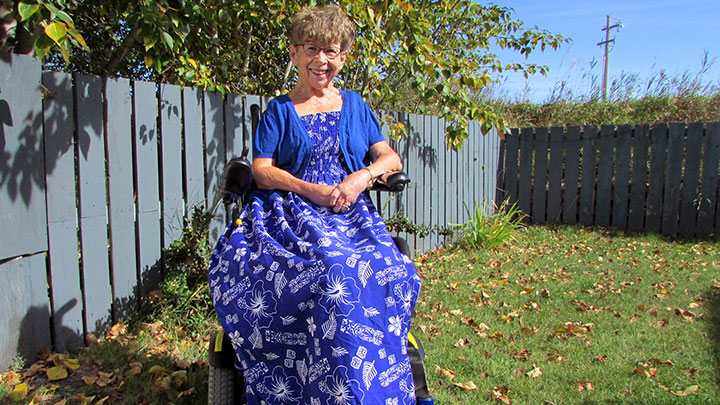
September 25, 2023

Linda Shepherd brings enthusiasm to her role as a longtime patient advisor and advocate for nutrition screening initiatives in Central Zone. Canadian Malnutrition Awareness Week runs Oct. 2-6. This year’s theme is Stronger Together. Photo supplied.
Story by Stephanie Krug
In Alberta, one in three older adults have difficulty getting enough nutrition and are at nutrition risk. In Canada, one in two adults admitted to hospital are malnourished.
Nutrition risk means there’s a greater chance of developing health issues, muscle loss, bone loss and malnutrition.
Older adults living in the community face higher nutrition risk. Lifestyle factors that may increase risk include social isolation and eating alone, not having enough money for food, and difficulty getting groceries and making meals. Medical factors that may increase risk include poor appetite, loss of taste or smell, depression and anxiety, difficulties chewing or swallowing, and losing weight without trying.
“Most of my clients aren’t aware that they may need a boost in their nutrition,” says Jennifer Sundberg, a dietitian in Red Deer, who often sees clients at nutrition risk. “Some aren’t getting enough protein-rich foods, while others aren’t getting enough calcium or iron-rich foods. This is where nutrition screening can help.”
Nutrition screening can be done by a health professional, community organization or group, or by older adults themselves. It’s a short questionnaire that asks about risk factors. Afterwards, older adults at risk, or who are malnourished, are connected to resources to reduce their risk. This can include community supports, group classes and nutrition education, as well as a referral to a dietitian in their community.
One champion of nutrition screening in Central Zone is Heidi Olstad, Nutrition Services Program Director, Evaluation and Population & Public Health.
“Awareness of your own risk, or that of your loved ones, is a great starting point to reduce these risks,” she says. “Good nutrition can help older adults stay strong and healthy as they age and keep them independent longer.”
Nutrition screening is only a starting point; there’s more work to be done.
“We want to learn about how older adults' prefer to learn and receive nutrition information so that we can best support them with their health and nutrition goals,” adds dietitian Sarah Frank Nichols, Provincial Practice lead, Nutrition Services.
Canadian Malnutrition Awareness Week runs Oct. 2-6. This year’s theme is Stronger Together.
To learn more about nutrition screening, check out our webpage and video.
Are you over 65 or know an interested older adult? Take our survey to share how you like to learn.